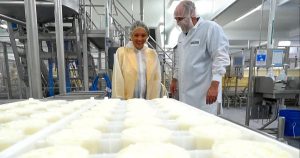
But the coronavirus pandemic and its effect on the dairy industry – loss of dairy sales and disruption of dairy consumption – came close to putting them out of business.
Nelson Schrock, the operations manager of the plant which is eight miles north of Cambria in Green Lake County, explains that the dairy facility is a key part of the local Amish community, offering jobs and a profitable market for those who milk cows.
During the heart of the pandemic, sales of the cheese produced in the plant plummted to zero, he says. There were no orders. “March 17th, 2020 was the worst day of my professional life – the most stressful time of my life.” The co-op responded by bringing together its management team to determine what they needed to do to survive.
Given their mission to help maintain the fabric and the economic health of their local Amish community, the management team felt the importance of their task. About 35 Amish men and women are employed in the dairy plant, and if it closed those people would be out of work.
“We put the business on life support,” he said. They developed survival tests. They cut milk prices and labor. They worked on their cash-flow and got interest-only concessions from their primary lender. But the landlord who owned their facilities could not lower the compensation package they were paying for the cheese factory.
After much consideration, the cooperative decided to exercise a provision that had been inserted by the founders of the cooperative into their legal contract with the landlord many years ago. The co-op declared the right to buy it back, which is unusual because normally Amish community members are not involved in owning such a property as it is equipped with electricity.
Economic lifeline for Amish dairy farmers
The Amish community surrounding the dairy plant got started in 1978 when families migrated from northern Indiana. At that time there were four existing creameries in the area but within a few years they closed or were getting ready to close – eliminating an economic lifeline for Amish dairy farmers.
The owner and cheesemaker of Salemville Cheese at that time came to the leaders of the Amish community to see if there was interest in keeping the plant in business.
The community approved the project, allowing members to work in the non-traditional setting (with electricity.) Nelson’s father, William, and his uncle LaVern Miller took the lead and the plant got started in 1984, once again making blue cheese as the plant had done before.
As the cooperative was getting off the ground, arrangements had to be made for the cheese factory and its business to move forward – the plant had to have a non-Amish owner.
“That is a standard for the community,” he said. In those first years the plant had gone through several owners and by 1993, the Amish group wanted to have a more stable situation. From that time through the pandemic, the co-op worked with the same owner.
Amish move to own creamery
But facing the effects of the market disruptions, and the fact that the owner couldn’t lower the rent for the plant, the Amish community pondered what would happen if the business no longer existed. There were eight community meetings during which that all-important mission of the cooperative was brought front and center. Local politics were part of the process, Schrock said, and five attorneys were involved. But 20 months later, the acquisition was finalized – in November, 2021.
“There were no civil wars. It was a slow approval process. The question came down to the choice of not having this business in operation versus owning it,” he said. “Everything ties back to preserving our way of life.”
The choice that the community made in purchasing the creamery, he said, is about their mission, protecting their way of life, keeping younger farmers in business and providing employment for all the men and women who work at the plant.
The average age of their dairy farmer-patrons is 37 years old, he notes, which is quite a bit younger than Wisconsin’s dairy farm population overall. “Having those younger farmers puts us in a position to keep this going into the future.”
Pandemic effects
Schrock likens his community’s passage through those dark days of the pandemic as the parable of the footprints in the sand – first there were two sets of footprints and then there was one. He believes that their community was lifted up and carried through those tough times.
One of the life preservers for the creamery through that period was the retail store. It is attached to the cheese factory and has been part of the facility from the start. “It was our biggest profit center at the end of 2020. It’s the only reason we had a profit that year,” he said.
Despite its location at a fairly remote country crossroads – 4481 County Hwy. GG, Cambria – there was a steady stream of retail cheese shoppers during those dark days of pandemic shutdowns.
During the summer, Schrock said, the cheese store is a stop on organized tours of local Amish businesses and is especially busy when gardeners are out in the country buying plants from nearby Amish-run greenhouses. During the summer months four nearby campgrounds are full and many of those campers stop in for cheese.
The dairy business, which operated for years as Salemville Cheese Cooperative, has made progress in a number of areas. In December 2017 the co-op positioned itself for growth with a large new addition to the country cheese plant.
Expansion adds improvements
At that time, they had completed their largest expansion yet, adding 15,000 square feet and including a fully enclosed bay to unload full cans of milk and reload the washed and sanitized cans. That expansion allowed them to completely move out of the then 117-year-old cheese factory next to the road where they started.
The new addition includes the intake where contracted non-Amish milk haulers bring the milk into the plant in an enclosed box truck designed for the purpose. All the Amish dairy farmers put their milk in cans and cool it in a well water tank at the farm. The haulers enter the intake facility, where a conveyor system allows workers to empty the 10-gallon stainless steel cans.
Each can is marked with a farm number. Weights and samples are taken and recorded from each as they are emptied. The cans and lids are washed, sanitized and returned to the farm.
After that the milk moves through a state-of-the-art pasteurization center and goes into cheese vats in the make room.
Workers place curds in small round forms and once that curd is set, the cheese comes out of the form and goes into brining tanks. The cheese eventually ends up in cold storage to be aged until it reaches the requirements of its standard of identity.
The plant inventories about 300,000 pounds of blue cheese on a daily basis.
Co-op grows over the years
When the co-op began in 1984 there were 20 patrons with an average of 10 cows in their herds; back then 10,000 pounds of milk per day came into their cheese factory in cans to make blue cheese. Today there are about 87 patrons with an average of 15 cows; 40,000 pounds of milk comes into their plant each day.
For 15 years the plant had only one licensed cheesemaker, Nelson Schrock’s uncle LaVern. But today there are two licensed and award-winning cheesemakers on staff, along with four apprentices.
They recently added 27 new producers from the Taylor Amish Community in northwest Wisconsin. “They came to us – one of many – who have asked if they could ship milk here. We always lay our mission on the table and details were worked out. Some others didn’t work out in the past.”
With an eye on their mission, Schrock said they have less than five non-Amish patrons shipping milk into the plant. He makes sure all their milk comes from Wisconsin farms.
The plant produces nearly 2 million pounds of cheese each year with much of it packaged and sold as crumbled product.
Product line
Their product line includes a variety of blue and Gorgonzola cheeses. He explains that once the mold that creates blue cheese is in a cheese plant it permeates the facility and no other kind of cheese, like Cheddar, can be made there. The exception is Gorgonzola cheese, which is a close enough cousin to blue that there isn’t a problem.
Their cheeses are now being marketed under the Kingston Creamery trademark and include Premium Blue, Gorgonzola, Smoked Blue, Organic Blue and a Blue Reserve that is aged 150 days. The newest product is a blue made from goat’s milk.
The cooperative created its new Kingston brand in 2018 and it was in growth mode for several years before the pandemic struck. “It slowed our growth but we continued to work on creating the brand,” Nelson said.
They also hired a sales organization in Houston, Texas to manage their sales and marketing platform. In addition, they hired multiple groups to manage the regions of the United States to target their product placement. They are growing their new brand in smaller metropolitan areas, especially in the West, Northwest, Southwest and South, he said.
Naming the brand
So many things resonated together to point to Kingston as the new name for the small Amish dairy cooperative, its products, its retail store and the dairy plant, he said. First, it is recognized among the Old Order Amish community. It is how the local group of Amish families is known – the Kingston Amish Community – because that is the name of the nearby town.
Schrock said he was involved in changing to the new name “almost like I was born with the idea.”
“There is so much history at Kingston. There’s a river in the town that has been used to power a mill and settlers used to grind grain with water power,” Schrock said. “There are also Native American burial grounds there. We just think it’s a really professional name and it was right for us in so many ways.”
The marketing specialists that are working with Kingston have some nice angles to work with. “Since the community doesn’t allow mechanical milkers and since our farms are all family run, we meet a lot of truly artisan requirements for our buyers. It is a true fit for the farm-to-table movement,” Nelson said.
Farmers allow their cows to graze on pasture whenever Wisconsin weather permits. In addition, all the Amish farmers shun the use of genetically modified crops, so down the road there is the potential opportunity to use that as part of their story. “We did a survey for the plant and every farmer raises non-GMO feed. All our farmers are virtually organic, they just haven’t been certified,” he noted.
The organic cheese currently marketed by Kingston is being made from milk from brokers who handle certified organic milk.
For years the co-op had talked about making and marketing a blue cheese made from goat’s milk. “It was kind of a chicken or the egg situation,” says Nelson.
They ended up getting goat milk from the Woodville Amish Community where Amish farmers were already milking goats. Now, there are also local farmers who want to milk goats and who are getting ready to begin sending their goat milk to the Kingston Creamery.























